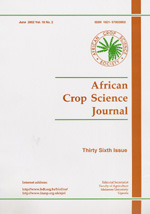
|
African Crop Science Journal
African Crop Science Society
ISSN: 1021-9730
EISSN: 1021-9730
Vol. 28, No. 3, 2020, pp. 421-439
|
 Bioline Code: cs20030
Bioline Code: cs20030
Full paper language: English
Document type: Research Article
Document available free of charge
|
|
|
African Crop Science Journal, Vol. 28, No. 3, 2020, pp. 421-439
| en |
Efficiency and possibilities for Arabica coffee-banana management systems switching in the Mt. Elgon landscape of Uganda
Sebatta, C.; Mugisha, J.; Bagamba, F.; Nuppenau, E.A.; Domptail, S.E.; Ijala, A. & Karungi, J.
Abstract
Sustainably intensifying rural agricultural systems is now a development goal that has gained momentum in the recent decades due to a rapidly growing population and feeds directly into the Sustainable Development Goals of ending poverty and hunger. By 2050, the world will be inhabited by 10 billion people, 68% of whom will be city dwellers which will pose serious food and livelihoods security threats to millions of people, especially in Sub-Saharan Africa. The objective of this study was to analyse technical efficiency of four production systems in Arabica coffee-banana farming system of the Mt. Elgon in Uganda and assesses possibilities for switching from one system to another. The study was motivated by the notion that smallholder farmers do not easily adopt new systems because of opportunity costs related to input substitution, input and/or efficiency reduction and systems redesigning. We estimated a production function to measure technical efficiency and ordered the intensification pathways to create a Technical Efficiency (TE) gradient. An ordered logit model was then estimated to determine the factors influencing farmers to switch among systems, by adopting one or more following a TE gradient. Results showed that farmers produced 50% of the maximum possible Arabica coffee output, indicating huge gaps between actual and potential yields. Use of fertiliser for the lowest efficiency. Low-input-low-output pathway and improved coffee genotypes, manure and labour intensification for the higher technical efficiency clusters such as conventional and mild agroecological would also significantly increase the chances of switching from low to highly efficient and sustainable Arabica coffee production systems in the Mt. Elgon watershed of Uganda.
Keywords
Mountain watershed; Ordered logit; production function
|
| |
| fr |
Sebatta, C.; Mugisha, J.; Bagamba, F.; Nuppenau, E.A.; Domptail, S.E.; Ijala, A. & Karungi, J.
Résumé
L’intensification durable des systèmes agricoles ruraux est un objectif de développement durable qui a été pris en compte pour mettre fin à la pauvreté et la faim dans une population en croissance rapide. Le monde sera habité par 10 milliards de personnes, dont 68% seront des citadins en 2050, ce qui posera de graves menaces à la sécurité alimentaire et des moyens de subsistance de millions de personnes, en particulier en Afrique Sub-Saharienne. L’objectif de cette étude était d’analyser l’efficacité de technique de quatre systèmes de production dans le système de culture café-banane Arabica du mont Elgon en Ouganda et évalue les possibilités de passer d’un système à un autre. L’étude était motivée par l’idée que les petits exploitants agricoles n’adoptent pas facilement de nouveaux systèmes en raison des coûts d’opportunité liés à la substitution des intrants, la réduction des intrants et / ou de l’efficacité et la refonte des systèmes. Nous avons estimé une fonction de production pour mesurer l’efficacité de technique et nous avons ordonné les voies d’intensification pour créer un gradient l’efficacité de technique (TE). Un modèle logit ordonné a ensuite été estimé pour déterminer les facteurs qui poussent les agriculteurs à basculer entre les systèmes, en adoptant un ou plusieurs suivant un gradient TE. Les résultats ont montré que les agriculteurs produisaient 50% de la production maximale possible de café Arabica, indiquant d’énormes écarts entre les rendements réels et potentiels. Utilisation d’engrais pour une efficacité minimale. Une filière à faibles intrants et à faible rendement et des génotypes de café améliorés, du fumier et une intensification de la main-d’œuvre pour les grappes à plus haute efficacité de technique telles que l’agroécologie conventionnelle et douce augmenteraient également considérablement les chances de passer de systèmes de production de café Arabica faibles à très efficaces et durables dans le bassin versant du Mont Elgon en Ouganda.
Mots Clés
Bassin versant de montagne; logit ordonné; fonction de production
|
| |
© Copyright 2020 - African Crop Science Society
|
|
